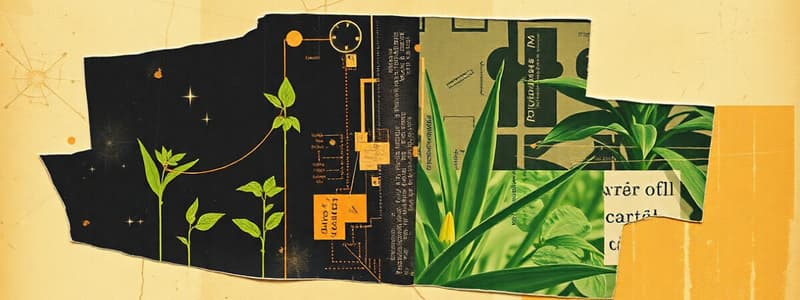Podcast
Questions and Answers
What is the primary pigment involved in photosynthesis?
What is the primary pigment involved in photosynthesis?
- Anthocyanin
- Chlorophyll (correct)
- Carotene
- Xanthophyll
Where does the Calvin Cycle take place in plant cells?
Where does the Calvin Cycle take place in plant cells?
- Cytoplasm
- Thylakoid membrane
- Stroma (correct)
- Mitochondrial matrix
Which of the following is a product of photosynthesis?
Which of the following is a product of photosynthesis?
- Oxygen (correct)
- Carbon dioxide
- ADP
- NADH
What is the main role of ATP in cells?
What is the main role of ATP in cells?
Which of the following processes occurs first in cellular respiration?
Which of the following processes occurs first in cellular respiration?
What are the outputs of the Krebs Cycle?
What are the outputs of the Krebs Cycle?
Which compound is necessary for the Electron Transport Chain to function?
Which compound is necessary for the Electron Transport Chain to function?
Which of the following statements is true regarding the reactants and products of photosynthesis and cellular respiration?
Which of the following statements is true regarding the reactants and products of photosynthesis and cellular respiration?
Flashcards
What is ATP?
What is ATP?
The main energy currency of cells, providing energy for processes like muscle contraction, active transport, and chemical reactions.
What is photosynthesis?
What is photosynthesis?
The process where plants convert light energy into chemical energy stored in glucose.
What are the light-dependent reactions?
What are the light-dependent reactions?
Occurs in chloroplasts, it uses light energy to produce ATP and NADPH, releasing oxygen as a byproduct.
What is the Calvin cycle?
What is the Calvin cycle?
Signup and view all the flashcards
What is cellular respiration?
What is cellular respiration?
Signup and view all the flashcards
What is glycolysis?
What is glycolysis?
Signup and view all the flashcards
What is the Krebs cycle?
What is the Krebs cycle?
Signup and view all the flashcards
What is the electron transport chain?
What is the electron transport chain?
Signup and view all the flashcards
Study Notes
Photosynthesis
- Photosynthesis is the process where plants, algae, and some bacteria convert light energy into chemical energy, storing it in glucose.
- It occurs in chloroplasts, specifically the thylakoid membranes and stroma.
- Chlorophyll absorbs sunlight, a crucial pigment in this process.
- Photosynthesis has two main stages:
- Light-Dependent Reactions:
- Takes place in the thylakoid membrane.
- Inputs: Light, water (H₂O), ADP, NADP⁺.
- Outputs: Oxygen (O₂), ATP, NADPH.
- Calvin Cycle (Light-Independent Reactions):
- Occurs in the stroma.
- Inputs: Carbon dioxide (CO₂), ATP, NADPH.
- Outputs: Glucose (C₆H₁₂O₆), ADP, NADP⁺.
- Light-Dependent Reactions:
ATP (Adenosine Triphosphate)
- ATP is the primary energy currency of cells.
- Structurally, it consists of adenine, ribose sugar, and three phosphate groups.
- ATP releases energy when a phosphate group is removed (ATP → ADP + Pᵢ).
- This released energy powers cellular functions like muscle contraction, active transport, and chemical reactions.
Reactants and Products of Photosynthesis
- Reactants: Carbon dioxide (CO₂), water (H₂O), light energy.
- Products: Glucose (C₆H₁₂O₆), oxygen (O₂).
Cellular Respiration
- Cellular respiration is the process where cells convert glucose into usable energy (ATP).
- It has three key stages:
- Glycolysis:
- Takes place in the cytoplasm.
- Inputs: Glucose.
- Outputs: 2 Pyruvate, 2 ATP, 2 NADH.
- Krebs Cycle (Citric Acid Cycle):
- Occurs in the mitochondrial matrix.
- Inputs: Pyruvate (converted to Acetyl-CoA).
- Outputs: CO₂, NADH, FADH₂, 2 ATP.
- Electron Transport Chain (ETC):
- Happens in the inner mitochondrial membrane.
- Inputs: NADH, FADH₂, O₂.
- Outputs: Water, ~32-34 ATP.
- Glycolysis:
Reactants and Products of Cellular Respiration
- Reactants: Glucose (C₆H₁₂O₆), oxygen (O₂).
- Products: Carbon dioxide (CO₂), water (H₂O), ATP.
Key Comparisons: Photosynthesis and Cellular Respiration
| Process | Reactants | Products |
|---|---|---|
| Photosynthesis | CO₂, H₂O, light energy | Glucose (C₆H₁₂O₆), O₂ |
| Cellular Respiration | Glucose (C₆H₁₂O₆), O₂ | CO₂, H₂O, ATP |
Study Tips
- Memorize the equations for both photosynthesis and cellular respiration.
- Understand ATP's role and how it's used in cells.
- Relate reactants and products between photosynthesis and cellular respiration.
- Review the organelles—chloroplasts for photosynthesis and mitochondria for cellular respiration.
- Use diagrams to visualize processes like the Calvin cycle and ETC.
Studying That Suits You
Use AI to generate personalized quizzes and flashcards to suit your learning preferences.




